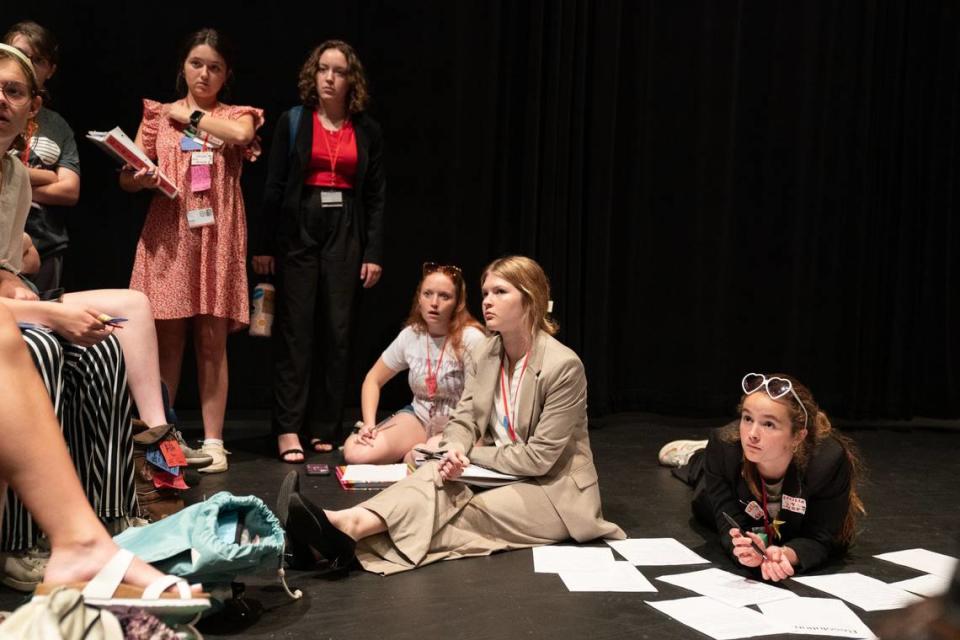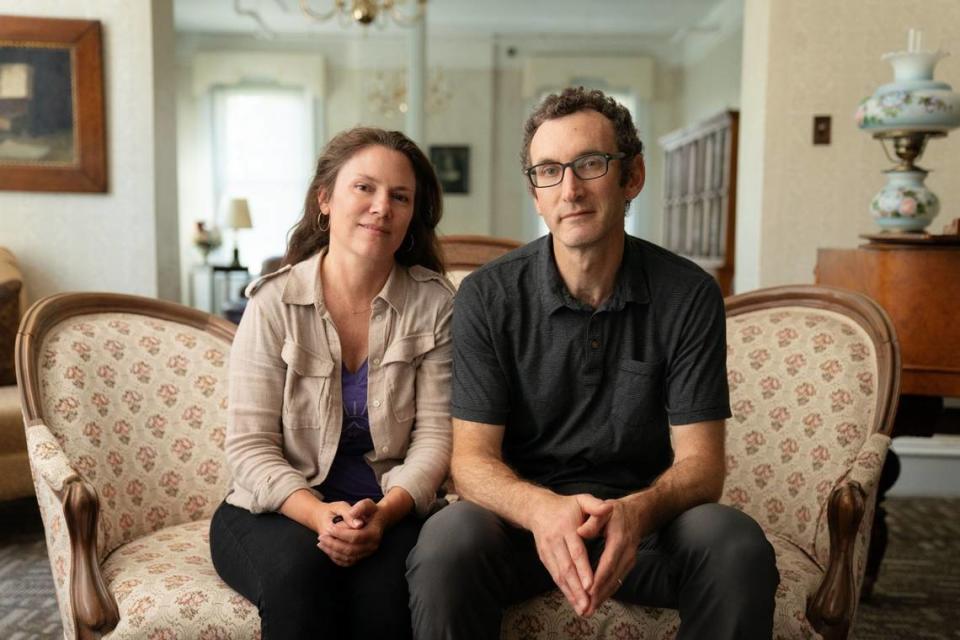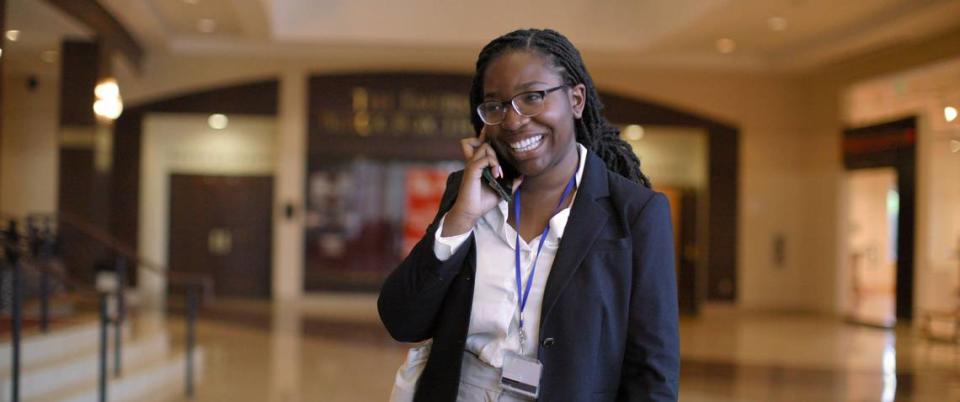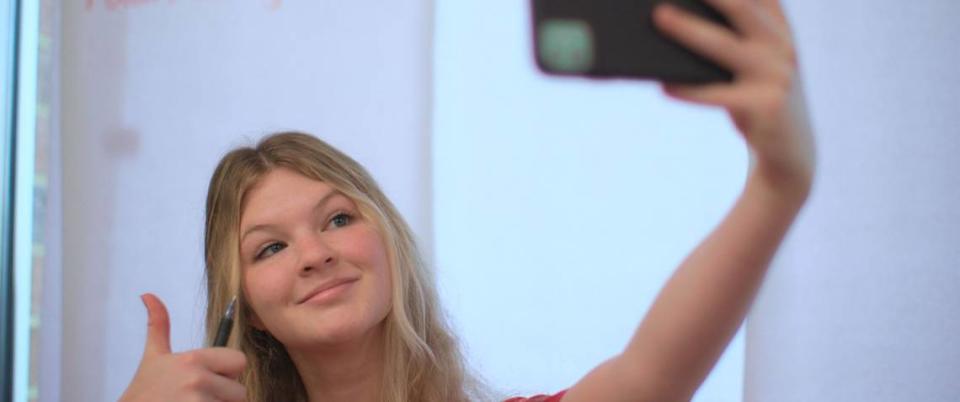How award-winning filmmakers chose Missouri for their new documentary, ‘Girls State’
For their Emmy-winning documentary “Boys State,” married filmmaking team Amanda McBaine and Jesse Moss presented what was described as “‘Lord of the Flies’ meets politics.”
They hoped that for their follow-up, “Girls State,” they would find a story that wasn’t just “‘Mean Girls’ meets politics.”
The resulting project, premiering April 5 on Apple TV+, is far from that, an inspiring and empowering look at how young women might run the nation … all occurring in Missouri, no less.
As one instructor announces in the feature-length documentary, “We want you to be the ones who straighten another woman’s crown rather than point out it’s crooked.”
“There’s a fundamental question to the project of: Do girls do things differently?” Moss asks. “Specifically, do they do politics differently? This is the microcosm of ‘Girls State.’ Now, can we extrapolate to a wider society? I’m not sure. We’re not behavioral scientists, we’re filmmakers.”
Shot in 2022 at Lindenwood University in St. Charles (30 miles outside of St. Louis), the project captures the American Legion’s weeklong government workshop. Here, some 700 Missouri high school juniors learn the rigors of government and how they impact education, law and commerce.

“We were scared of making ‘Girls State’ because to make a film you know is going to be compared to another is a really frightening prospect,” McBaine says.
Fortunately, once she began interviewing the prospective participants, all that fear dissipated.
“They’re passionate about politics, they’re smart, they’re ambitious, but also they share their emotions with a confidence that’s not true of all teenagers, let alone all adults,” she says. “If you put a camera on somebody, a lot of people clam up. But there was something special about these kids who could share that with us. Once I met them, I felt much more confident about making this movie, and I was like, ‘I could watch you grocery shop and be happy as a filmmaker.’”
One of the eight main subjects featured is Faith Glasgow, a Lee’s Summit student who notes in the film that she was voted “most judgmental” in Girl Scouts.
“I got to know the girls who were in my ‘city’ fairly well. But it wouldn’t be completely honest to say I actually knew these girls for real,” says Glasgow, who is currently majoring in political science and psychology at Mizzou.
“The exhaustion and sort of delirium that sets in toward the end of the week makes people a little more honest and a little more genuine. So you definitely see people in their really good moments and also in the really bad moments too. It’s kind of like summer camp in a way.”

Another factor that arose almost immediately — for both the girls and the filmmakers — was the blatant inequities between Girls State and the concurrent Boys State taking place on the same campus.
“We knew we were ‘not in Kansas anymore,’ so to speak, when arriving at Girls State and all the counselors were sort of ‘bedazzled,’” McBaine says. “That was new. And it was fun — I got the ‘fun-ness’ of it. But it was also like, ‘What does that have to do with government?’”
That was hardly the only difference. The girls had to follow a buddy system on campus. The boys didn’t. The girls had a dress code. Not the boys. Most glaringly, Boys State’s elected “governor” got sworn in by actual Missouri Gov. Mike Parson. The girls? Sworn in by a judge. In fact, no state or federal politicians met with the girls.
“I didn’t know about the fiscal inequality either until I watched the film,” Glasgow says.
“Not everything was unequal. We had great speakers, but their speakers they invited seem to be more popular or more present in the media, which to me just kind of screamed, ‘We have (three times more) money to ask these people to be here.’”
However, the injustices faced soon gave way to the demanding responsibilities of the program.
“We were so caught up in our own campaigning or in our own instructional classes or simply trying to make friends with women across Missouri,” she says. “While I was angry regarding the inequities that I learned about, the more immediate ones were more apparent. There were guys with their shirts off running around alone outside, whereas women couldn’t be in a sports bra. And by the way, it was one of the hottest weeks of the summer.”

The other concurrent issue that grew hard to ignore was the event took place mere days before Dobbs vs. Jackson upended abortion rights. McBaine admits the specter of this case loomed large.
“It was on all their minds, regardless of their political views. And especially in Missouri, given its abortion politics,” McBaine says.
Moss adds, “We knew it would be a powerful visual to see the seven members of Girls State Supreme Court — and see an all-female Supreme Court — hear an abortion case. I think it’s a powerful metaphor for talking about the lack of representation for women.”
“Boys State” was shot in Austin, Texas, and became a Sundance festival hit. (Former President Barack Obama notably named it as one of his favorite films of 2020.) When the filmmakers decided to do a follow-up, they didn’t have a specific place in mind.
“We looked around and auditioned state programs,” Moss says. “We liked Missouri for a couple of reasons. One is it’s got interesting politics. Not a battleground state, but it’s got (Republican Sen.) Josh Hawley and it’s got (Democratic Rep.) Cori Bush … and sort of everything in between. It’s got the big cities; it’s got rural and suburban communities. So it had a breadth and diversity we were attracted to.”
Most importantly, for the first time in the state’s history, both Boys and Girls State were going to be held on the same campus at the same time. This juxtaposition proved too intriguing for the filmmakers to ignore.
Equal to the challenge of securing a location was the challenge of focusing on the right “cast” to follow during the shoot.
Glasgow attended an informational meeting to learn about the Girls State program in general, when she was approached by one of the film’s co-producers, Aurora Brachman, about being a core subject.
She recalls, “Aurora asked a group of us if anyone would be interested. Of course, all the girls were interested. They were like, ‘What? A movie?’”
After various in-person and Zoom interviews, Glasgow became one of the selected few.
“I think I have a strong personality type. I’m assertive and a little intense. That reads like a character, if you will,” she says.
Glasgow claims to have grown up “viscerally conservative.”
“My parents are Christian, and with that ideology comes very conservative values. But I fell down my own political pipeline in late elementary into middle school. It was online-based, and I got caught up in the algorithm that YouTube and various other platforms were feeding me.”
She claims to have received “really biased information,” and much of her opinions were very right-leaning. Her outlook has shifted as she’s gotten older, and that’s reflected in her journey onscreen.

When asked what’s the best single word to describe Glasgow, Moss replies, “Sharp.”
“She’s sharp about politics, sharp with her point of view and her humor is sharp. She’s kind of barbed, and I love that. We have two teenage daughters, and one of them worked as a PA in production. The other, who’s 14, watched the rough cut, and we said, ‘OK, of these girls in the film, which one did you identify with most?’ And she said, ‘Faith. 100%.’”
In fact, their daughters were instrumental in the picture getting made in the first place.
“We were struggling with the decision to do another one because ‘Boys State’ was such a success, and you never know if the next film is gonna resonate,” Moss said.
“In wrestling with that decision, I told Amanda, ‘Let’s do it if for no other reason than our daughter can work with us in production. She’s a teenage girl. These are questions she’s asking herself about her voice, about our democracy, about her future. Let’s give her that experience. And if it’s a total disaster, at least we’ll have that.’”
McBaine confesses the strategy worked out well for everybody.
“For (our daughter), it was a real rude awakening on how hard adults actually work. She was a production assistant, which is a pretty brutal job on a 30-person crew. … I think she loved seeing what her parents actually do. And she did love witnessing how a film set becomes its own little city, and the brilliance of the inner workings and machinery and family of it,” says McBaine, who’s been married to Moss for 19 years.
Would America be a better place if it was predominantly run by women?
“I think America would be better if it was run by at least half women, if the representation was more accurate to our population,” McBaine responds. “That to me is outrageous that it’s 2024 and we’re still at 28% in Congress and in governorships, and the fact we don’t yet have a female president — at this point, the more I think about it, the more it doesn’t make sense.”
Glasgow concurs that “Girls State” provides a small-scale model of how politics could work … and possibly should work.
“The film is able to show what maybe a world without political polarization — as extreme as it is in America — looks like. We see a really great friendship between Maddie (Rowan) and Emily (Worthmore) in the film. Emily is openly conservative and Maddie’s openly liberal — she claims she supports Bernie Sanders at the time,” Glasgow says.
“Adults can like take away from the film that politics doesn’t have to be so polarized. Open conversation is a good thing. Judging people right off the bat based on their political opinions is simply unnecessary.”
Jon Niccum is a filmmaker, freelance writer and author. His new book is titled “Power Up: Leadership, Character and Conflict Beyond the Superhero Multiverse.”

 Yahoo Sports
Yahoo Sports 
